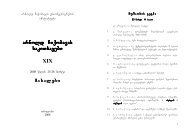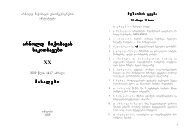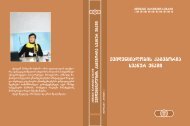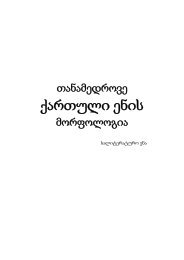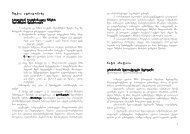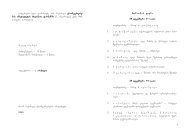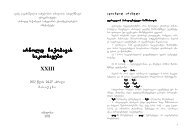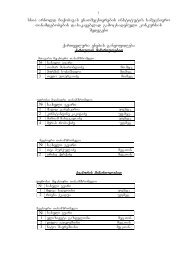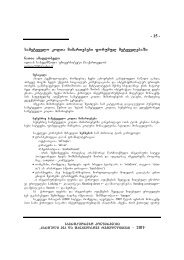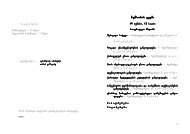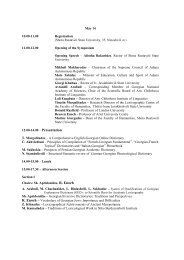5 r. a b a S i a (Tbilisi) bgeraTSesatyvisobis erTi rigisaTvis qarTvelur ...
5 r. a b a S i a (Tbilisi) bgeraTSesatyvisobis erTi rigisaTvis qarTvelur ...
5 r. a b a S i a (Tbilisi) bgeraTSesatyvisobis erTi rigisaTvis qarTvelur ...
You also want an ePaper? Increase the reach of your titles
YUMPU automatically turns print PDFs into web optimized ePapers that Google loves.
We will discuss those peculiarities of linguistic marking of the socio-cultural<br />
behavior norms which is characteristic only for the Buddhist Sinhalese.<br />
To this point, the following examples can be discussed:<br />
a) Due to the gender peculiarity it is traditionally defined that men<br />
don't have to drink in the society or in the family before women. If the women<br />
see this fact it is considered to be offensive for them. Therefore on the social<br />
events men usually take some alcohol in separate room. As for women the drinking<br />
of alcohol is not allowed at all.<br />
b) The peculiarity of religious ritual is that no shoes or head-covering<br />
are permitted at the temple.<br />
c) Ethnographic peculiarities of the rituals also variesi, for example, the<br />
different rituals of wedding, funeral or New Year ceremonies.<br />
d) The standard norms of socio-cultural behavior are determined by different<br />
features, such as: age, caste, or rank. For example, it is prohibited for the<br />
representative of lower caste to marry the higher one or conversely (although<br />
Sri Lanka is a traditional country, there are many cases when this rule can be<br />
broken). Another example of the social behavior norm is that youngers are to<br />
worship the elders: grandparents and parents, everyday when they leave home.<br />
Also a general rule- to speak elders standing is obligatory for the Sinhalese too.<br />
From the above mentioned cases some norms of specific social behavior<br />
can be linguistically marked in Sinhala language.<br />
The following examples can be discussed:<br />
1. In Sinhalese society there is the privileged institute of marriage between<br />
so called “cross cousins” (children of a sister and a brother) ( in Georgian<br />
cousins are not denoted by one word, but there are three different names: bizashvili<br />
(uncle’s child) , mamidashvili (father’s sister’s child) and deidashvili<br />
(mother’s sister’s child). In Sinhalese folklore there are many songs dedicated<br />
to love stories of massinā ( male cousin) and nǃna (female cousin). The marriage<br />
between parallel cousins (between sisters' children or between brothers’<br />
children) is prohibited. The rules of privileged marriage and prohibited one are<br />
linguistically marked in Sinhala. The terms denoting parallel siblings are different<br />
from cross-cousin names such as: gnati sahoyura (male) and gnati sahoyuri<br />
(female) in literal language while the spoken Sinhala variety uses the terms denoting<br />
siblings such as: akka "elder sister", nangi "younger sister", malli<br />
"younger brother" aiya "elder brother".<br />
57



